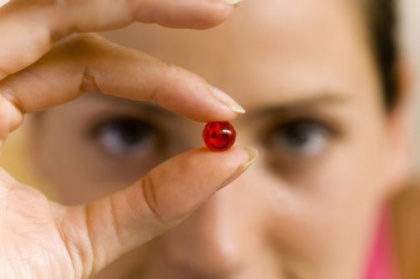Vibrators of all shapes and sizes stimulate blood flow to the clitoris, helping women who suffer from anorgasmia to reach their climaxes and, Dr Streicher says, should be prescribed regularly
Once a medical device prescribed to treat ‘female hysteria,’ vibrators have largely been relegated to the realm of sex toys and novelties and remains illegal in two states – Alabama and Mississippi – in the US.
But Dr Lauren Streicher, a gynecologist and sexual health specialist at Northwestern University, says that women’s difficulty orgasming should be treated as a medical issue and that vibrators should be offered as a solution.
Speaking at the American College of Obstetricians a Gynecologists’ meeting this week, she pushed doctors to educate themselves and ask patients about their orgasms.
An estimated 4.7 percent of women in the US suffer from anorgasmia, meaning that they have difficulty climaxing, have weak climaxes or are unable to climax at all.

Reaching orgasm is difficult for psychological reasons for some. But, ‘certain medical conditions that result in decreased blood flow to the clitoris and nerve endings don’t respond as well,’ says Dr Streicher.
But for many women, Dr Streicher says, a vibrator can change that, or at least be the exception.
When she sees patients, Dr Streicher has them fill out a pre-screening form that includes detailed questions about their orgasms and how they achieve them.
‘It’s a little check list and they check off whether they can orgasm with digital stimulation, oral stimulation sex or a vibrator.
‘It’s no surprise that many women check ‘no, no, no, no,’ and then they get to the vibrator and check yes,’ Dr Streicher says.
Especially for an older woman who ‘at one point in her life could orgasm through digital or oral simulation and now isn’t able to, it may be due to a vascular or neurological problems so that she needs more stimulation so she can have an orgasm,’ she says.
But there is still an undeniable stigma around vibrators, and, in some places, even laws against them.
You cannot own vibrators in Alabama, Mississippi or Georgia – where one town will give you jail time if you do buy one.
In Texas, an arcane law limits dildo possession to six, while keeping as many guns is perfectly legal.
Instead of being regulated like firearms, Dr Streicher says vibrators should be looked at more like medical devices.
Vibrators provide that much more intense stimulation, and have the added benefit of increasing blood flow to the clitoris.
About half of all women use vibrators, according to a 2009 survey.
‘But many – especially over 50 – who come from a a different culture are not comfortable with the idea of using one,’ says Dr Streicher.
This is also the group most likely to have difficulty reaching orgasm for physical reasons, and for whom a vibrator might be most useful.
‘So to have a doctor recommend to use once can really go a long way,’ Dr Streicher says.
A vibrator can be purchased for as little as $1 (or as much as $400 – but many cost around $30), making it a much cheaper option than a $200 sex therapy session.
The problem is doctors and patients rarely reach that point in their conversations, says Dr Streicher.
Women very rarely feel comfortable enough to take it upon themselves to broach the subject of their sex lives and satisfaction, a phenomenon so well-documented in medical literature that Dr Streicher says it is a fact.
Equally well-established is the fact that doctor’s don’t ask.
‘Women may just be too shy or embarrassed, and we know doctors don’t ask about it,’ Dr Streicher says.
‘Doctors may as if you are sexually active or if you are okay sexually, but it’s not the same thing as asking if you are able to orgasm,’ says Streicher.
And she says that the onus to bring it up should not be on the patient, any way, but on her doctor.
‘From my point of view, it’s not that doctors would be uncomfortable asking about orgasm, the don’t because they don’t ask you about things if they don’t have solutions,’ she says.
‘So if I continue to get out there and educate doctors that there are solutions’ – namely, vibrators – ‘the more likely it is that they will ask,’ she explains.
Dr Streicher says that her presentation was given to a ‘packed room of wildly enthusiastic doctors’ to whom she says she need to ‘give a script,’ for how to talk to patients about orgasms and the vibrators that can bring them on.



